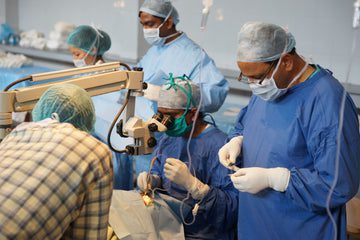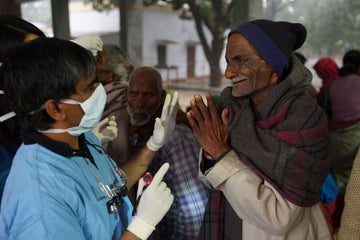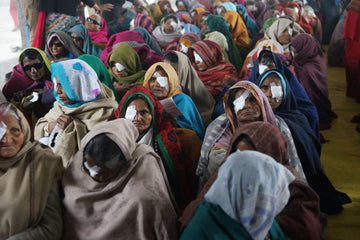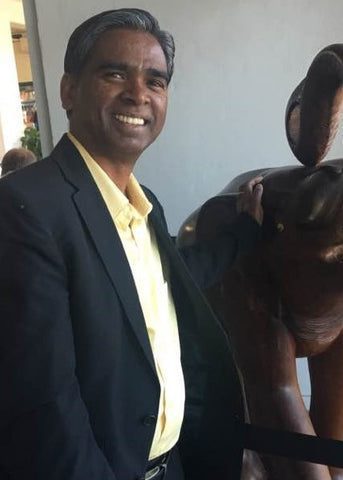Give the gift of sight
Eyes for India has been granted
tax-deductible status in Australia.

Project history
Eyes for India is a not-for-profit community organisation that provides treatment to people living in India who suffer from operable cataracts, and who otherwise cannot afford surgery due to poverty or lack of local health care facilities.

What does Eyes for India do?
We continue to raise public awareness of blindness in India, by supporting the Ruby Nelson Memorial Hospital in Jalandhar, India. Dr Jacob Prabhakar is the leading surgeon.

How many people can I help with my gift?
$75 - Gives Sight to 1 person
$375 - Gives Sight to 5 people
$1,500 - Gives sight to 20 people
$2,400 - Gives sight to everyone in an average size village.
HOW DOES YOUR DONATION HELP?
Step 1
Dr. Jacob Prabhakar, medical director of Ruby Nelson Memorial Hospital, heads a team of professionals who conduct screening clinics in rural communities to find candidates for surgical procedures which entails removing the defective lens and implanting an intraocular lens.
Step 2
Medical staff with their basic screening equipment travel to remote rural villages to find those needing cataract surgery.
Step 3
Patients selected for surgery are transported to a local hospital equipped for surgery, or to the Ruby Nelson Memorial Hospital. Patients are prepared for the surgical procedure by trained personnel.
Step 4
Cataract surgery takes only 2-3 minutes for each patient. Patients are prepped in such a way that as many as 300 surgeries can be performed in just one day.
Step 5
After surgery, patients are kept up to three days for post-operative care and observation before they return to their home village.
Each patient is presented with a gift pack of materials in their own language, which is designed to improve their health and to help them understand that we care about their well-being and vision.
Numbers speak
India is always ready for a challenge.
You might be surprised to find that India is home to the world’s largest number of blind people. Of the 37 million people across the globe who are blind, over 15 million are from India – a direct result of its under development and large population living in poverty – especially in Northern India. Medical research has shown that 75% reported cases of blindness in India were the result of avoidable blindness.
Most of this blindness comes from lack of medical treatment at an early age as result of uncorrected near-sightedness and far-sightedness, and the most common culprit being cataracts, which cloud the lens of the eye. Simply put those in poverty cannot afford simple treatments and remote villages do not have access to the treatments. Your support provides a mobile service that visits villages, finds suitable candidates and transports them to Ruby Nelson Memorial Hospital for corrective surgery. We stop the poverty cycle. Thankfully, eyesight can be restored by means of a very simple surgery.

Eyes for India Oceania
Our Mission
“Our Mission is to raise funds in support of the work of gifted Eye Surgeon, Doctor Jacob Prabhakar Chindrupu, to remove cataracts and restore sight to the needy blind people in India.”
Eyes for India Oceania assists the gifted Eye Surgeon, Doctor Jacob Prabhakar Chindrupu, in healing cataract blindness in India.
Cataract blindness affects over 15 million people in India and this number increases every year. Eyes for India Oceania is able to achieve its mission of fundraising through the service of our many volunteers.
Through the efforts of Project Managers, Robert and Angela Kalaf, and our valued volunteers and supporters, it is our pledge to share the vision of Doctor Prabhakar in restoring sight to the countless blind people in India.
I once was blind, but now I see
The Vision
In 2002, Doctor Jacob Prabhakar Chindrupu, an outstanding medical student in India, realised his dream of becoming a much-needed eye surgeon. In August 2013, Doctor Jacob’s vision for Eyes for India Oceania was handed to Robert (Bob) George Kalaf in Australia at a time when Robert aspired to work with a worthy humanitarian cause.
Robert Kalaf and his wife Angela believe the vision is an answer to their prayers and feel privileged to be part of this great humanitarian cause.
The Rewards of Fundraising: Witnessing the outpouring of joy of the beneficiaries after surgery, makes all the effort of the Eyes for India Oceania team so worthwhile.
This is evidence that catching The Vision together, working and looking forward in the same direction, brings results. Our cup overflows with blessings just to know that these dear people can now say, “I once was blind, but now I see”. John 9:25